Footnotes
- ↑ Obituary of Sir Richard Jackson, The Times, 18 February 1975
An editor has nominated this article for deletion. You are welcome to participate in the deletion discussion , which will decide whether or not to retain it. |
The Metropolitan Police Office (MPO) was the department of the British Home Office which administered the Metropolitan Police of London, the only British territorial police force to be administered by central government. It existed from the creation of the force in 1829 until the introduction of the Metropolitan Police Authority in 2000 and handled all the force's administrative requirements. Under the authority of the receiver, it was based at Scotland Yard and headed by a secretary, who was, although a civilian, equivalent in rank to the assistant commissioners. [1]

Metropolitan counties are a subdivision of England which were originally used for local government. There are six metropolitan counties: Greater Manchester, Merseyside, South Yorkshire, Tyne and Wear, West Midlands and West Yorkshire.

The Metropolitan Police Service (MPS), formerly and still commonly referred to as the Metropolitan Police, is the territorial police force responsible for law enforcement and the prevention of crime within the ceremonial county of Greater London. In addition, it is responsible for some specialised matters throughout the United Kingdom, including national counter-terrorism measures and the protection of specific people, such as the monarch and other members of the royal family, members of the government, and other officials.

Telford and Wrekin is a borough and unitary authority in Shropshire, England. In 1974, a non-metropolitan district of Shropshire was created called The Wrekin, named after a prominent hill to the west of Telford. In 1998, the district became a unitary authority and was renamed "Telford and Wrekin", which remains part of the Shropshire ceremonial county and shares institutions such as the Fire and Rescue Service and Community Health with the rest the county.
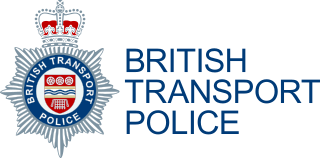
British Transport Police is a national special police force that polices the railway network of England, Wales and Scotland. The force polices more than 10,000 miles of track and more than 3,000 stations and depots.
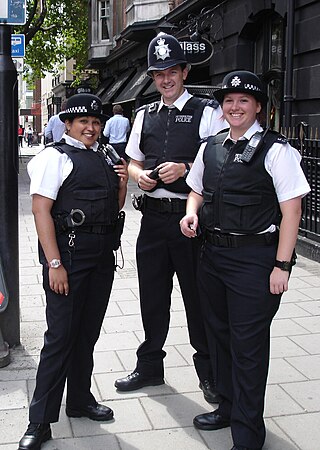
Law enforcement in the United Kingdom is organised separately in each of the legal systems of the United Kingdom: England and Wales, Scotland, and Northern Ireland. Most law enforcement duties are carried out by those who hold the office of police constable of a territorial police force.
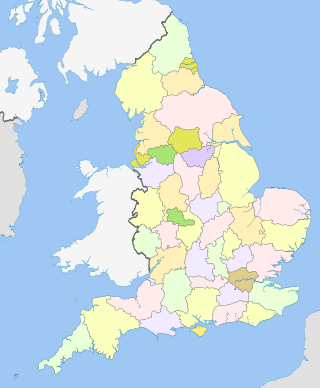
The counties of England are divisions of England. There are currently 48 ceremonial counties, which have their origin in the historic counties of England established in the Middle Ages. The current ceremonial counties are the result of the Lieutenancies Act 1997 and are based on the Local Government Act 1972 administrative counties which included a number of new counties such as Greater Manchester and Tyne and Wear. However, some counties introduced by the Local Government Act 1972, including Avon and Cleveland, no longer exist. The term "county", relating to any of its meanings, is used as the geographical basis for a number of institutions such as police and fire services, sports clubs and other non-government organisations.

The Commissioner of Police of the Metropolis is the head of London's Metropolitan Police Service. Sir Mark Rowley was appointed to the post on 8 July 2022 after Dame Cressida Dick announced her resignation in February 2022.
A police authority in the United Kingdom is a public authority that is responsible for overseeing the operations of a police force. The nature and composition of police authorities has varied over time, and there are now just four dedicated "police authorities" in the United Kingdom, although the term can refer to various similar successor bodies.

The Dublin Metropolitan Police (DMP) was the police force of Dublin, Ireland, from 1836 to 1925, when it was amalgamated into the new Garda Síochána.
Chief constable is the rank used by the chief police officer of every territorial police force in the United Kingdom except for the City of London Police and the Metropolitan Police, as well as the chief officers of the three 'special' national police forces, the British Transport Police, Ministry of Defence Police, and Civil Nuclear Constabulary. The title is also held by the chief officers of the principal Crown Dependency police forces and the Sovereign Base Areas Police in Cyprus. The title was also held, ex officio, by the president of the Association of Chief Police Officers under the Police Reform Act 2002. It was also the title of the chief officer of the Royal Parks Constabulary until this agency was disbanded in 2004.
Police ranks are a system of hierarchical relationships in police organisations. The rank system defines authority and responsibility in a police organisation, and affects the culture within the police force. Usually, uniforms denote the bearer's rank by particular insignia affixed to the uniforms.

Cambridgeshire Constabulary is the local territorial police force that covers the county of Cambridgeshire and Peterborough unitary authority. It provides law enforcement and security for an area of 1,311 square miles (3,400 km2) and population of 856,000 people, in a predominantly rural county. The force of Cambridgeshire includes the cities of Cambridge, Ely and Peterborough, the market towns of Chatteris, Huntingdon, March, Ramsey, St Ives, St Neots, Whittlesey, and town and Port of Wisbech. Its emblem is a crowned Brunswick star containing the heraldic badge of Cambridgeshire County Council.

The Police Federation of England and Wales (PFEW) is the statutory staff association for police constables, sergeants, inspectors, chief inspectors and special constables in the 43 territorial police forces in England and Wales. Under UK labour law, the police are prohibited from joining ordinary trade unions to defend pay and working conditions, by the Police Act 1996, because of the view that a police strike would pose an exceptional public safety risk. The PFEW was originally established by the Police Act 1919 as an alternative system, which would serve to represent staff, and where disputes could be resolved through arbitration so long as the government continued to bargain in good faith.

The Metropolitan Police District (MPD) is the police area which is policed by the Metropolitan Police Service in London. It currently consists of the ceremonial county of Greater London, which excludes the City of London. The Metropolitan Police District was created by the Metropolitan Police Act 1829 as an ad hoc area of administration because the built-up area of London spread at the time into many parishes and counties without an established boundary. The district expanded as the built up area grew and stretched some distance into rural land. When county police forces were set up in England, those of Essex, Hertfordshire, Kent and Surrey did not cover the parts of the counties within the MPD, while Middlesex did not have a county force. Similarly, boroughs in the MPD that elsewhere would have been entitled to their own police force did not have them.
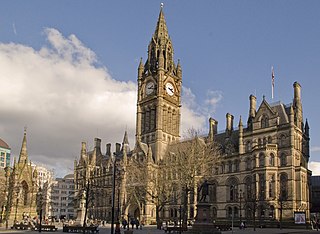
The City of Manchester forms part of the metropolitan county of Greater Manchester, which had its county council abolished in 1986. Manchester consists of several districts, but these districts do not represent a tier of government.

The Indianapolis Metropolitan Police Department (IMPD) is the law enforcement agency for the city of Indianapolis, Indiana, in the United States. Its operational jurisdiction covers all of the consolidated city of Indianapolis and Marion County except for the Airport Authority and the four excluded cities of Beech Grove, Lawrence, Southport and Speedway. It was created on January 1, 2007, by consolidating the Indianapolis Police Department and the road division of the Marion County Sheriff's Office. Indianapolis Park Rangers were merged into IMPD in 2009.

Mary Sophia Allen OBE was a British political activist known for her defence of women's rights in the 1910–1920s and later involvement with British fascism. She is chiefly noted as one of the early leaders of the Women's Police Volunteers. Allen repeatedly sought to challenge or modernise the existing systems of the time, ensuring the Women's Police Service could become an auxiliary force after women were admitted into certain British police forces. She stood once for the House of Commons as an Independent Liberal, turning over her Women's Auxiliary Service to breaking the General Strike of 1926. Thereafter she met and talked with European fascists and anti-communist brigades, entailing frequent trips abroad and publicly joining the British Union of Fascists in 1939. In retirement Allen was an activist for animal rights.
Susan Penelope Akers CBE QPM is a retired Deputy Assistant Commissioner of the British Metropolitan Police Service.
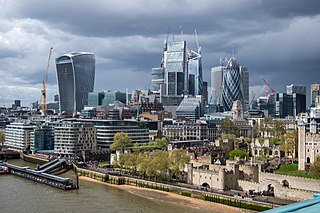
Greater London is the administrative area of London, England, coterminous with the London region. It contains 33 local government districts: the 32 London boroughs, which form a ceremonial county also called Greater London, and the City of London. The Greater London Authority is responsible for strategic local government across the region, and regular local government is the responsibility of the borough councils and the City of London Corporation. Greater London is bordered by the ceremonial counties of Hertfordshire to the north, Essex to the north-east, Kent to the south-east, Surrey to the south, and Berkshire and Buckinghamshire to the west.